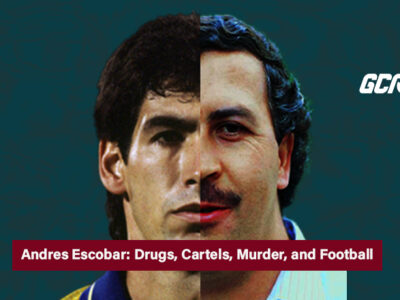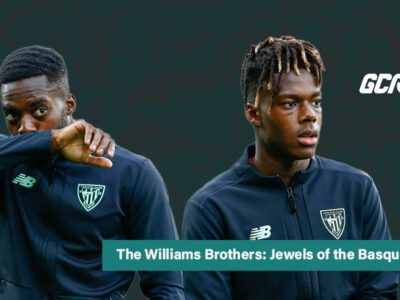Anthony Joshua just knocked out Francis Ngannou in the 2nd round of their gimmick “Knockout Chaos” fight.
Yes, it was an impressive victory, and all seems right in the boxing world, but how did we get here?
Let’s take you back to October 2023.
The still image of Francis Ngannou hovering over the lineal boxing world champion Tyson Fury shocked the world.

This was meant to be a fight for the title of the “Baddest Man on the Planet” — a gimmick fight cherry-picked to make the boxing champ look good.
That flash knockdown wasn’t meant to happen. Francis Ngannou flipped the entire script on Frank Warren, the Fury family, and the entire boxing world.
For me, that moment finalized the slow but steady decline of boxing as a respectable sport.
This colossal embarrassment had been on the cards for the past decade, and it took a hard-hitting MMA outsider to expose it.
But did they learn? No.
It took a straight punch from a hyperfocused Anthony Joshua to set things right in the heavyweight division.
For a better comparison, I’ll be drawing examples from other combat sports promotions, specifically MMA and the UFC.
But, first, let’s explore the history of MMA and the UFC in parallel.
A brief history
In the early 2000s — the dark ages of the UFC — people scoffed at the idea of grown men in briefs fighting each other.
Even politicians like John McCain abandoned pressing issues to chime in on the issue in the late 1990s. He coined the phrase “human cockfighting”, claiming that the sport belonged in the Colosseum.
It took the efforts of unapologetic celebrities like Joe Rogan to defend MMA from such ignorance. Many more years of lobbying and reforms brought the MMA detractors around.
Floyd Mayweather also made disparaging comments about MMA, referring to it as a sport for “Beer drinkers.”
What irony that Floyd had to fight an MMA fighter to grab one last ounce of relevance.
Seeing the history of elitism and disparaging remarks from the boxing fans, believe that I won’t let this one go.
Boxing is corrupt to the core
Every sport is corrupt. Look at the shambles called FIFA. The NFL sweeps things under the rug faster than a disgruntled witch.
That’s how they all function and navigate the multicultural cesspit flowing with blood money.
But what makes boxing stand out is that the sport pedestalizes corruption. From shady promoters tied to organized crime to judges delivering horrendous decisions to protect their cash cows, boxing takes the cake.
Every third major bout ends in some controversial decision or call that drives fans and pundits insane.
While this keeps the bottom line intact, it is a turn-off for well-meaning fans and lifelong enthusiasts who care about the sport’s integrity.
Narcissistic promoters
When you think of the UFC, Dana White comes to mind as the promoter. But with boxing, the promotions are just everywhere.
Names like Frank Warren, Floyd Mayweather, Eddie Hearn, Don King, and anybody involved with the Furys come to mind.

And who can keep these egotistical maniacs in check? Nobody. These men can derail a fight just to placate their egos.
This makes you wonder how many potential blockbuster events were lost to the egotistical whims of middle-aged money grubbers.
Too many boring snooze fests
Another reason for the rapid demise of boxing is that most top-level fights turn into snooze fests. Fighters on the main card care more about not getting knocked out than entertaining the crowd.
Yes, this self-preservation might be wise if you want to eke out a decision. But you know what doesn’t go viral? Two fighters clinching for ten rounds.

I won’t deny that working through the clinch is part of boxing. But when I pay $49.99 to see a fight, I want to see entertainment. Spare me the crap about the technicalities of two men hugging each other every five seconds.
Risk-averse champions
One reason boxing has become so boring is that promoters are obsessed with the “0”—they go to all lengths to keep their golden geese unbeaten.
They’d rather crush cans — beat up lesser opponents to make themselves look great.

That’s the only reason Anthony Joshua refused to fight Tyson Fury or Deontay Wilder. That’s why Fury opted to fight Francis Ngannou instead of preparing for his bout with Oleksandr Usyk.
That’s the only reason Anthony Joshua decided to fight Francis Ngannou as a “side quest”.
As the gods of combat would have it, fighting to protect a spotless record is a recipe for disaster.
Anthony Joshua lost to Andy Ruiz, effectively derailing his entire career trajectory as the Golden Boy of Boxing.
Even though Tyson Fury managed to squeeze past Ngannou, albeit controversially, he no longer looks invincible. And he definitely is not the baddest man on any planet.
With a convincing win over Francis Ngannou, Anthony Joshua looks set to fight the winner of Fury and Usyk in May 2024.
Inflated records
Stat padding also comes from the culture of risk-averse champions and promoters.
That’s why we see champions in different divisions with 42 wins—and over 80% of their opponents are nowhere near the elite.

Compare that to the UFC, where the best fighters almost always end up in the Octagon with a ranked opponent within an average of 3.5 fights.
Matchmaking nightmare
And when risk aversion meets stat padding, we get the unending matchmaking nightmare.
If you are not dealing with narcissistic promoters, the broadcasters will be fighting for splits even if the fight happens.
Get your money by all means, but what about what the fans want?
Why can’t DAZN, Showtime, ESPN, and other broadcasters figure out a way to make these cross-promotions seamless?
Where is the governing body ensuring that these fights happen regardless of petty promoter or broadcaster squabbles?
Too many meaningless belts
And speaking of governing bodies, boxing has a unification problem. The average fan tuning in to watch a fight cannot keep track of all the 17 weight classes and 5 belts for each division.
So this leaves a potential for 80+ champions at any given time interval.
For every fight, I now have to spend time on Wikipedia to figure out who has the WBC belt and who the lineal champion is.

No, this is too much work for casual fans and younger audiences.
If these organizations can’t care enough to come up with one main belt per division, fans won’t care either.
Boring press conferences
The UFC is entertaining because you have fighters from around the world hyping up the fight with trash talk.
Call it undignified or crass, but it sells tickets.
Young viewers crave meme-able moments and highlight reels. They want to see stuff kicking off at the press conference.
We want to see Conor hauling bottles at the Diaz Brothers. We want to see Muhammad Ali scamper for safety as Sonny Liston pulls a gun at him.
The violence aside, seeing some personality helps endear fighters to fans. Enough of the boring “I’ll show this guy come Saturday” spiel. Show me what I’m paying for today.
Very few superstars
McGregor, Khabib, Diaz brothers, Adesanya, Ronda Rousey. These are names that resonate with sports fans and even casuals. Fighters like Chimaev and Jon Jones also have worldwide notoriety.
In boxing, only a few household names are on the roster.

Once you get past the 4 heavyweights and Canelo, you’d really struggle to find legit superstars. Gone are the days of Tyson, Ali, Holyfield, Roy Jones, and Frazier.
Inactive fighters
The main driving factor for the lack of superstars is that these boxers don’t fight often enough.
Imagine seeing your favorite boxer once every 12-18 months. This is not enough time to get to know their story and foster a parasocial relationship with them.

For context, UFC champions like Israel Adesanya and Kamaru Usman used to fight 2-3 times a year as champions. This kept them in the conversation year-round.
YouTube Boxing
The penultimate nail in the coffin is the gimmick of YouTube boxing, which KSI and Logan Paul spearheaded.
Say what you want about the duo, but this was an opportunity for boxing to tap into a new audience of gamers and young people.
But what did they do? They scoffed at the ridiculousness of the YouTube boxing scene. In fact, the YouTubers did more for boxing than the boxing commissions.

Apart from bringing new eyes to the sport, they helped retired and out-of-favour boxers earn some cash and adulation.
And then came the Fury shenanigans.
With Tommy Fury, a professional boxer, narrowly shaving two decisions against YouTubers, there is no way the new internet fans would take the sport seriously.
In one month, the Fury family almost dealt the entire boxing world a resounding KO by goofing around instead of actually fighting.

As if we haven’t had enough, Jake Paul is about to fight Mike Tyson in July 2024.
With all this, you now understand that Anthony Joshua just saved Francis Ngannou from heaping sand on boxing’s grave.
Who wrote this?
Ugo is a sports enthusiast with an undying love for underdog stories.





















